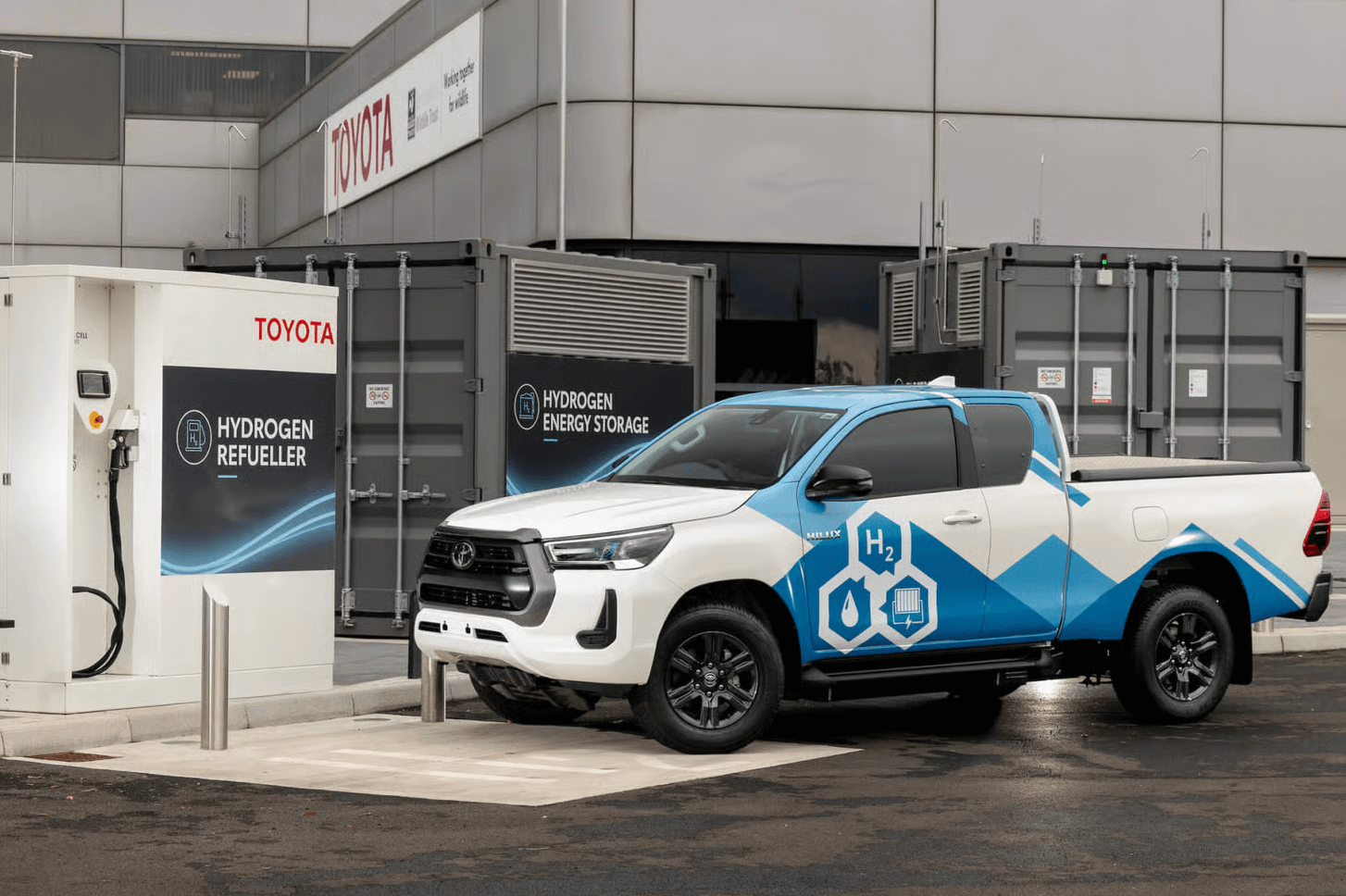Shifting Gears: The Impact of Toyota's Hydrogen Pickup Truck

Photo courtesy of H2 View
Earlier this year, Toyota introduced the first prototype of its revolutionary hydrogen-powered pick-up truck, the Hilux. By year’s end, they aim to have manufactured 10 of these vehicles. This project, which builds on over 10 years of research and development across Toyota’s other efforts at hydrogen fuel power for vehicles, is a breakthrough for carbon-neutral automotive innovation.
And it couldn’t come at a better time. Toyota has been increasing public interest in hydrogen fuel, including successful consumer-facing product lines and recent showcases targeting commercial-side skeptics. This all amounts to a note of confidence for both hydrogen-powered vehicles specifically and a more sustainable energy future more broadly.
Below, we’ll walk through Toyota’s Hilux announcement and what’s so exciting about it.
The Innovation Behind the Prototype Hilux
Given its early-stage development, limited information is available about the technical specs for the hydrogen-powered Hilux. The powertrain is confirmed to be modeled after the Toyota Mirai, which has led to speculation that the Hilux will feature about 182 horsepower and torque of 220 lb-ft. Toyota has also confirmed a driving range of 600 km with zero emissions.
The innovations behind these targets have been powered in part by public, nonprofit, and private funding. This includes support from the UK Government and stakeholders such as the following:
- European Thermodynamics (ETL), a global leader in efficient thermal solutions
- D2H Advanced Technologies, an expert in high-tech engineering and CFD analysis
- Ricardo, an environmental consultancy firm that helped integrate the hydrogen cells
- Thatcham Research, a risk intelligence firm that has helped mitigate potential threats
Their efforts have thrust Toyota into a leadership position in integrating hydrogen power in consumer vehicles—just as the auto giant is charting a similar path in the commercial space.
Expanding into Commercialization
Toyota first sparked broad commercial interest in hydrogen power when it participated in 2022’s Zero and Near Zero Emissions Freight Facility (ZANZEFF) Shore to Store (S2S) event. The pilot project in the Port of Los Angeles showed how well trucks powered by hydrogen fuel cells stack up against their electric and conventional counterparts in a series of performance tests.
The stakes for the event could not have been higher. Conventional wisdom among professional drivers was that alternatives to diesel rarely got the job done. This critique made sense, considering “the job” often means towing upwards of 82,000 lbs over 300 to 600 miles. And previous attempts at doing so in a carbon-neutral way had often fallen short. But where others failed, Toyota’s trucks succeeded.
The trucks in question were a collaboration between Toyota and Kenworth, and they proved that hydrogen fuel can easily power a truck driver’s daily driving of around 240 miles. By the end of the event, it was clear that any preconceived notions about the truck’s abilities had been put to rest.
Seeing what fuel cells could do, many were eager to get their hands on hydrogen trucks.
Toyota's Collaboration with PACCAR
Toyota’s innovations have the potential to reshape the commercial trucking industry. On the heels of the ZANZEFF S2S event, Toyota announced an expanded partnership with PACCAR, the parent company behind Kenworth and several other widely recognized commercial vehicles.
Given the success of the hydrogen-powered models, the two automotive giants committing to further collaboration signals a sea change in the industry. Manufacturers and other stakeholders have been reluctant to commit fully to more sustainable energy sources, as electric options that work well in consumer vehicles often cannot handle commercial tasks as well as diesel.
Other would-be adopters may have also been unaware or skeptical of hydrogen’s potential.
But Toyota appears to have answered the electric vs hydrogen debate for trucking, at least for now. And, together with PACCAR, they may usher in an era of hydrogen-fueled commerce.
The Future of Clean Energy in the Automotive Industry
The logistics of hydrogen storage, transportation, and distribution remain among the biggest obstacles to a widespread takeover of the fuel source across all automotive applications. And, most often, it’s commercial and other industrial-grade vehicles that account for much of these logistical hangups. But, thanks to Toyota’s success, these challenges are clearly navigable.
Toyota has provided proof positive that hydrogen-powered vehicles can get the job done on a professional level. And, pending the success of the Hilux and other similar models, they are making a strong case for the rapid adoption of hydrogen fuel across every automotive context.
The innovators at Toyota aren’t alone in their bet on the fuel source. GM is making waves in the mining industry with its recent partnership with Komatsu. And other big players pushing for greater hydrogen adoption include Hyundai, Chevron, and local governments across the US.
This all means that hydrogen might well be the future of clean automotive energy.
Realizing the Potential of Renewable Energy
The biggest takeaway from Toyota’s recent moves in hydrogen power is that it’s here to stay, for both consumer and commercial vehicles. When successfully adopted, it could be one of the most significant drivers of a more sustainable future.
FASTECH is committed to building sustainable, clean energy infrastructure. What excites us about news like this is how it illustrates the potential for hydrogen to meet a wide variety of needs for both commercial and consumer use cases. As an end-to-end energy solutions provider, we help people integrate renewable energy sources into their lives efficiently.
Are you interested in getting involved in the renewable energy space? Get in touch today.




